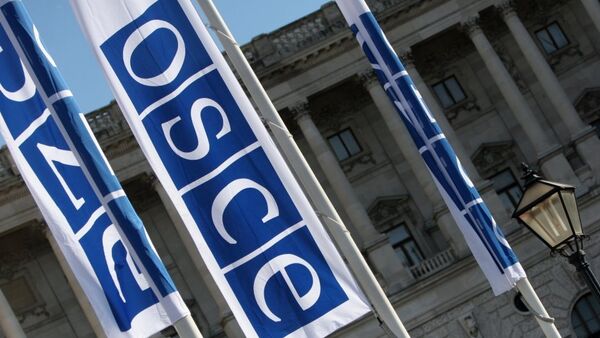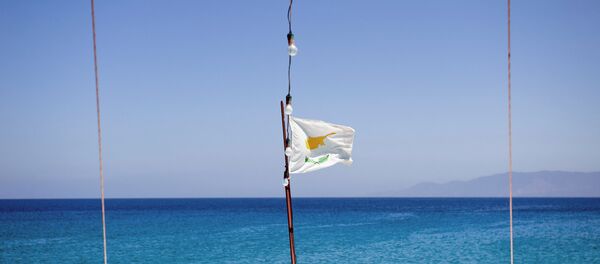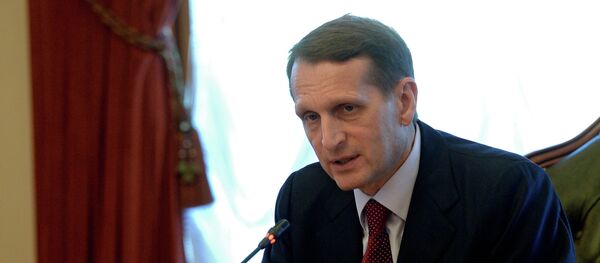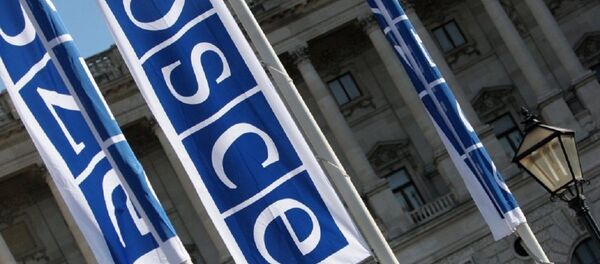HELSINKI (Sputnik), Svetlana Alexandrova — On Wednesday, Finnish authorities denied travel visas to several members of the Russian delegation set to participate in the Parliamentary Assembly of the Organization for Security and Co-operation in Europe (OSCE PA), including Naryshkin, who is on the EU travel ban list of persons, accused of alleged involvement in the Ukrainian crisis.
In response, the Russian delegation decided to completely refrain from participating in the assembly’s summer session.
The discussion opened by OSCE PA President and Finnish parliamentarian Ilkka Kanerva, included the participation of delegates from 20 OSCE participating states.
The Finnish government made a decision to deny Russian lawmakers entry visas only after consultations with almost all the EU member states, Kanerva said Sunday.
"The decision: was made after Finland has made notification to almost every single EU country if Finland should allow the blacklist people to enter: Member countries of the EU, they didn't want to accept it and Finland was obliged to take this decision. The decision was not made by us," he said at the standing committee of the OSCE Parliamentary Assembly.
The European Union, the United States and a number of other countries imposed several rounds of anti-Russia sanctions accusing Moscow of alleged involvement in the Ukrainian crisis. Entry bans for several Russian individuals were part of the restrictions.
In late May, Russian Foreign Ministry reportedly distributed among EU embassies a list of 89 EU member states' diplomats, politicians and military experts banned from entering Russia.
Delegates Condemn Sanctions Against Russian Lawmakers
The delegates from more than 15 countries expressed their concern about the impact of the Finnish government's decision on the assembly's ability to conduct dialogue and work on conflict-resolution. Several speakers discussed the considerations that led to the decision and ways in which the situation could have been avoided.
In particular, head of the Austrian delegation Christine Muttonen underlined that one of the main strengths of the OSCE PA is that it hold its meetings in various countries.
Head of Armenian Delegation Artashes Geghamyan in the interview to Sputnik on Sunday accused the EU states of hijacking the right of all OSCE PA participating member states to decide on the participation of Russian delegates.
"Unfortunately, it does not characterize the Parliamentary Assembly in the best and artificially diminishes its role and place, because the participation of this or that delegate should be decided directly by the parliamentary assembly, which is guided by the rules of procedure," he added.
On behalf of the Cyprus delegation, Sophoclis Fittis condemned the actions of Finland’s government noting that "although, EU member-states implement pertinent Council's decisions, this is an international meeting, and the EU member-states may and need to grant exemptions to travel bans when they host an international intergovernmental organization, a UN conference or the OSCE."
Ikka Kanerva, the president of the OSCE PA, stressed the need to address the European Union to reconsider rules in relation to sanctions against parliamentarians, so that every member country could get free access to the PA sessions.
"The President vowed to consider ways to communicate with the EU about effects of sanctions on international events involving parliamentarians… It could be at the next session," Richard Solash, director of Communications at OSCE PA said, commenting on the Kanerva’s remark.
'Anti-Russian Nature' of OSCE PA Session
The OSCE PA session itself was completely of anti-Russia nature, delegate from Russia Nikolay Kovalev said after he left the standing committee's meeting to protest against the OSCE PA voting results on anti-Russia Resolution, initiated by Canada.
He stressed that the decision to put the anti-Russia draft resolution on the agenda after failing to obtain required two thirds of votes is a gross violation of the procedure.
Earlier in the day, Nikolay Kovalev called for the assembly not to breach the PA protocol by reviewing the draft resolution for the second time after it was approved during the previous OSCE PA session in 2014 in the Azerbaijan's capital of Baku.
On Sunday, Russia and a number of other countries declared that they were against the OSCE PA decision to remove two Russia-initiated draft resolutions from the agenda of the current annual session.
Earlier in the day, President Ilkka Kanerva explained this decision by the absence of the Russian delegation at the session. The session was to consider two draft resolutions initiated by the Russian delegations. One of them is on the inadmissibility of using sanctions against lawmakers from OSCE member countries and the other on the necessity of joint OSCE measures to prevent manifestations of neo-Nazism.
OSCE PA Welcomes New Secretary General
The Director of Presidential Administration of the Parliamentary Assembly of the Organization for Security and Co-operation in Europe, Roberto Montella, was elected to be the next Secretary General with a term beginning in January 2016 for the period of five years.
It was announced at the conclusion of the first day of the OSCE Parliamentary Assembly's session by Kanerva.
Montella was elected by the 46 yes-votes, three no-votes and three ballots left blank.
He will take the position of the OSCE PA General Secretary after two decades of work in the international politics and the OSCE.




